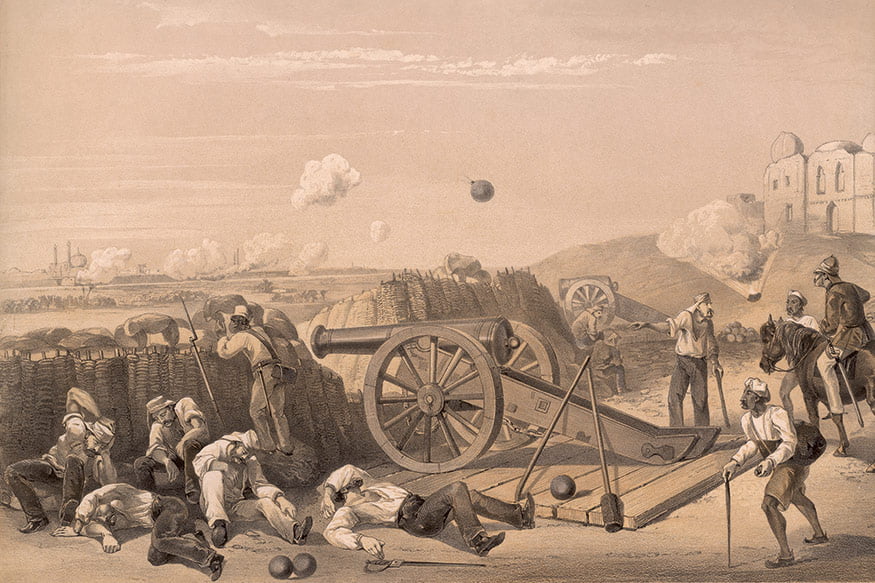Revolt of 1857:The first spark of independence lit on May 10, 1857, continued the struggle of the Indian people for 90 years and forced the British to leave the country.
Remembering the revolt of 1857 fills every Indian with pride. On this occasion, the President, the Vice President, the Prime Minister & all the citizens of India pay tribute to the heroes of the revolution. Most people get emotional by remembering the struggle and sacrifices made for freedom.
Indian soldiers started the revolution on 10 May 1857 against the British & the British East India Company Raj. The first freedom movement started in Meerut and very soon it reached many important places in the country. The British government was horrified and terrified. The Britishers, afraid of the revolution of 1857, had to make many changes in governance. Now come and let us read what were the 5 biggest results of this struggle which had a long-lasting effect after the revolt of 1857:
East India Company Raj ended
As soon as the freedom struggle of 1857 slowed down, the British Parliament ended the existence of the East India Company by passing a law in the year 1858. The company rule got over. Queen Victoria had to take full power of rule over India into her own hands. To assist this, an ‘Advisory Council’ of 15 members was formed. Out of these 15 members, 8 were appointed by the government and 7 by the ‘Court of Directors.
Hindered the expansion of the empire.
The Indian people were told to return their pride and rights. The Indian monarchs had to promise to abide by all treaties of Queen Victoria. She also promised to control the desire to expand her empire. She said that she would not infringe on Indian people’s territory or rights. Along with this, she also talked about ending religious exploitation in the government and appointment in government services without discrimination. The policy of expansion of the empire ended and the tricks of bringing about the era of economic exploitation were started.
Military Reorganization Begun
The number of European troops was increased based on military reorganization and fresh recruitment. The appointment of Indians to high military posts was stopped. The artillery was completely under the control of the British army. Now the ratio of Indian and British soldiers in the army for the Bengal Presidency has become 2:1. At the same time, this ratio became 3:1 in Madras and Bombay Presidencies. The recruitment of soldiers among the upper caste people was halted.
Renamed the post of Governor-General
Under the Act of 1858, the designation of the Governor-General in India was changed and he was given the designation of ‘Viceroy’. In 1861, the ‘Indian Councils Act was passed as part of a merger effort in the field of representation in the administration of Indians. In 1861, the ‘Indian Councils Act was passed as part of a merger effort in the field of representation in the administration of Indians. With this, the feudal system, which was considered to be helpful to the British in the country, collapsed. The trust of the Indian people was lost in him.
Openly Propagation of Christian Religion Slowed down
A religious outlook was also one of the immediate causes of the revolt of 1857. It had a big impact. In 1857, the Mughal Empire ceased to exist in the country. At the same time, the illusion of people being high was also erased. Along with this, the propagation of Christianity, which was being done openly by getting the help of the British, also stopped. Missionaries changed their form and started to make the field of service a means of conversion.
Who started the first revolt of independence?
On March 29, 1857, a soldier named Mangal Pandey revolted against his officers in ‘Barrackpore Cantonment,’ but British military officers easily controlled the military rebellion and disbanded him and his troops, and the rebel movement was suppressed on April 24th.
At Parade Meerut, 85 of 90 cavalrymen refused to take fresh cartridges. These 85 horsemen were sentenced to 5 years in prison for disobeying orders by a court-martial. The ‘open rebellion’ began on Sunday, May 10th, between 5 and 6 p.m., at the First Foot Detachment. These insurgents opened fire on their officers, killing ‘Hearse’ and shooting ‘Afsar Bagh.’ On April 8, Mangal Pandey was hanged. On May 9, 85 soldiers in Meerut were sentenced to nine years in prison for violating security terms after refusing to use the new rifle.
Revolt of 1857 Effects:
Following this tragedy, the flame of revolt started to spread throughout the country in Meerut City. The War of 1857 got its start on May 9 with the Meerut Rebellion. The Indian soldiers at Meerut killed British commanders and broke the prison & freed all Indians. They traveled to Delhi on May 10. The revolutionary warriors from Meerut arrived in Delhi on May 11 and took control of the city on May 12.
These soldiers declared the Mughal emperor Bahadur Shah II as the emperor of Delhi to break the monotony of Britishers. Soon after the rebellion spread to Lucknow, Allahabad, Kanpur, Bareilly, Banaras, Bihar, and Jhansi, and breakthroughs grew rapidly afterward. The British first captured Delhi by calling an army from Punjab. On September 21, 1857, the British recaptured Delhi, but ‘John Nicholson’ was killed in the struggle and Lieutenant ‘Hudson’ assassinated Bahadur Shah II’s two sons, ‘Mirza Abu Bakr’, and was shot. The rebellion started in Lucknow on June 4, 1857. British President Henry Lawrence died after the encounter at the British residence by the revolutionary soldiers there. Havelock and Outram tried hard to suppress the Lucknow revolt but they were unsuccessful. Finally, Colin Campbell and the Gurkha regiment in his support were successful in capturing the city in March 1858.

